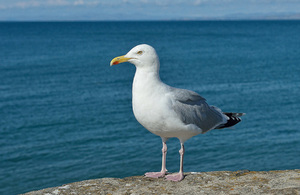Advice on how to deal with problem gulls
Natural England recognises that a number of problems with gulls in urban areas have been highlighted in recent weeks.

Herring gull [© Natural England]
Typically, these issues have involved lesser black-backed gulls and herring gulls, which can become particularly aggressive during their nesting season and when rearing young.
In many cases the problems can be avoided or kept to tolerable levels by local authorities and landowners taking preventative measures such as installing netting or wire over vulnerable roosting areas, keeping food storage and waste facility areas secure and discouraging deliberate feeding of birds by the public. These can all be carried out without a licence from Natural England.
Where such measures are proving ineffective, local authorities and landowners can take immediate action if these gulls pose a risk to public health or safety under the terms of a general licence, (a licence which is already in place provided certain conditions are met). This allows them to remove the nests and eggs of lesser black-backed gulls and herring gulls without having to spend time applying for a specific, individual licence. It also allows lethal control of lesser black-backed gulls in certain circumstances. Herring gulls, however, have been red-listed as a bird of conservation concern so their lethal control is only permitted by obtaining an individual licence from Natural England.
James Diamond, Natural England Operations Director, said:
Natural England provides clear licensing advice to local authorities and landowners on the actions they can take to manage potential gull problems. Where certain species pose a risk to public health or safety, immediate action is allowed; this can include removing their nests and eggs and, for lesser black-backed gulls, lethal control if necessary.
We recommend that local authorities develop a long-term management strategy, using a package of measures, to keep gull numbers in check.
Like all wild birds, gulls and their eggs and nests are protected under the Wildlife and Countryside Act 1981 which is why Natural England – the statutory conservation agency – licences any action affecting them.